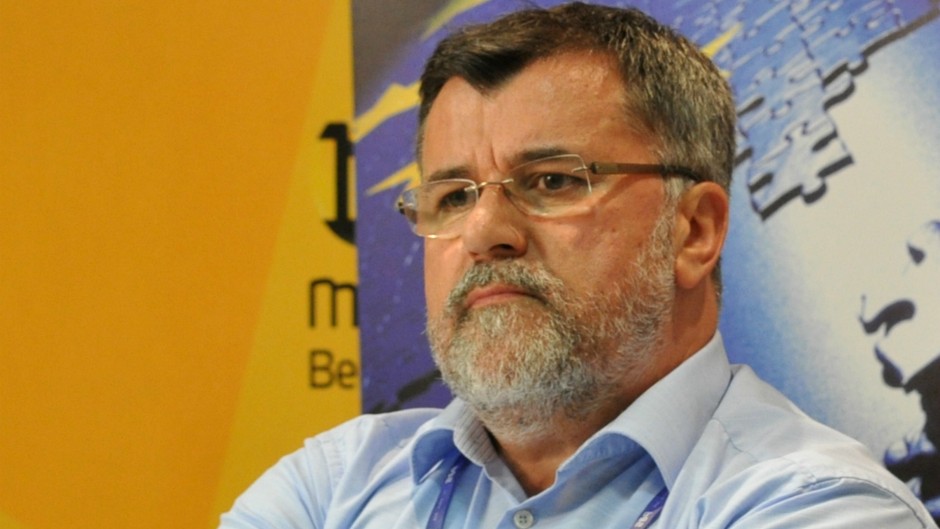BELGRADE, 19.07.2018. – A heated debate was held about journalism and the violation of the presumption of innocence by lawyers, journalists and judges gathered for a round table.
The controversy arose over the comments made by the president of the Commission Investigating Murders of Journalists, Veran Matic, on the trial for the murder of journalist Slavko Curuvija, Beta agency reported.
After Matic stated that he had the impression that the trial chamber in the case with some of its decisions showed a clear intention to release those accused of the murder, the High Judicial Council and the Association of Judges of Serbia reacted by assessing that he had violated the presumption of innocence, while the Belgrade Bar Association suggested changing the Criminal Code.
As the president of the Belgrade Bar Association Jugoslav Tintor said at the gathering, the idea is to “protect the rights of the defendant,” which is why he proposed introducing a new criminal act that could send officials, journalists and editors to up to three years in prison if they publish a statement or a news item that violates the right to the presumption of innocence.
“Freedom of expression is not absolute, and the right of citizens to be informed is not absolute. It must be in balance with the right to a fair trial and the right to privacy,” Tintor said at the round table held at the Association of Journalists of Serbia.
He stated that “the media making rulings” and that for this reason, “there was no chance to judge fairly in some cases” – an that journalists must be creating an atmosphere in public that no one is guilty until the court determines the contrary.
Tintor also said that journalists should evaluate credibility of statements in order to prevent the violation of the presumption of innocence, and when asked whether this includes statements made by the president and ministers, he replied negatively – “because it is enough if it is recorded with a camera or a dictation device.”
He did not agree with his colleague, lawyer Zdenko Tomanovic, who said that the assessment of the Serbian Judges Association was inadequate, describing the Bar’s proposal as “absolutely inappropriate.”
“One cannot go to jail for suspecting bad practice,” said Tomanovic, and stressed that it was the duty of journalists to shed light on all suspicious situations.
“There is no legal security without the presumption of innocence, but there is no free citizen if we do not have a free journalist, there is no healthy society without free journalists and their right to sometimes impinge upon the inviolable rights of an individual,” the lawyer said.
Tomanovic said that the political elite in Serbia is the main creator of fostering the lack of legal culture, that politics rule the judiciary, and that “the Serbian judiciary is dependent and there are only independent judges in it as individuals.”
Deputy President of the Serbian Judges Association Omer Hadziomerovic said that the freedom of opinion and expression have their limitations and that a journalist should not make blanket assessments, as the criticism must be based on facts.
“A journalist must choose their words, must take into account what effect they will have among the public, here the idea was presented that the court would release the defendants, and that in fact the court should find them guilty,” the judge said.
However, he did not explain precisely how Veran Matic had violated the presumption of innocence of the accused, since he also presented arguments in favor of his suspicion in his commentary.
Journalists Ljiljana Smajlovic insisted on a presice explanation from Hadziomerovic, but he responded in principle, after which he ultimately assessed that “everyone has the right to their own opinion and can maintain it.”
NIN journalist Vuk Cvijic assessed that he, like all journalists, should have an obligation to write about the course of the trial for the murder of Slavko Curuvija. “I expect the president of the Commission Investigating Murders of Journalists to react in such a wy,” Cvijic said, adding that it was especially problematic that a case of a murder of journalist was chosen as an example of a violation of the presumption of innocence.
In a debate with lawyer Tintor, the journalist repeatedly assessed that there was a fallacy and that this concrete case was about “the time of Slobodan Milosevic, when the state was killing.”
“The presumption of innocence is violated by the media close to the authorities, there is not even an ‘m’ of media there, journalists are threatened here, they are physically attacked,” said Vuk Cvijic.
Veran Matic was also present at the gathering, and said that he made similar assessments earlier, that they did not cause harsh reactions and that it was missing “during the daily violation of the presumption of innocence by the executive authorities.”
He recalled that in 1998 the Information Law launched “a systematic witch-hunt,” that the courts were ordering draconian penalties that led to the “cleansing of the journalistic profession.”
Matic reiterated his position – that he believed the trial chamber in charge of the Curuvija case was under pressure, but that it was “invisible” – and said that the safety of journalists in Serbia is today endangered.
“Journalists, especially those engaged in investigative journalism, are endangered safety-wise, I think that the judiciary is in serious crisis, and I think there are many reasons to work together to understand our function and our role,” said Matic.








